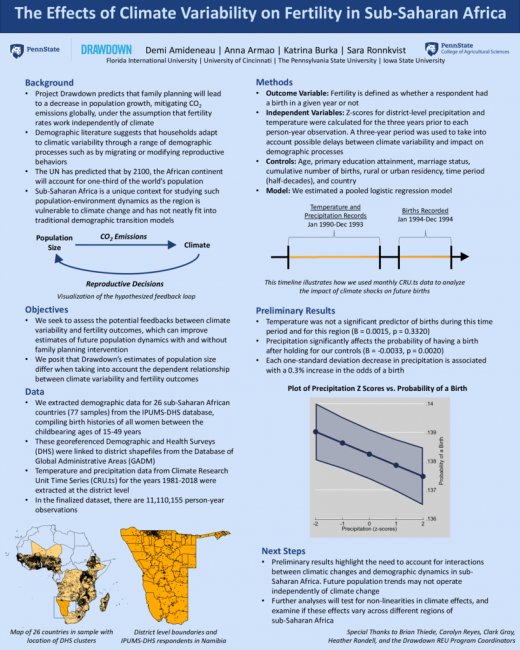Previous literature has predicted that population levels will continue to rise throughout the upcoming century, raising questions about Earth’s carrying capacity. The UN has predicted that by 2100 the African continent will account for one third of the world’s population, posing a unique opportunity to study population dynamics in the region which has not neatly fit into traditional demographic transition models. Project Drawdown predicts that family planning and increased education for girls will lead to a decrease in population size, mitigating CO 2 emissions globally under the assumption that fertility rates work independently of climate. However, recent demographic literature suggests that households adapt to climatic variability through a range of demographic processes, such as by migrating or modifying reproductive behaviors. Relatively few studies have addressed the latter. This project examines the empirical relationship between climatic changes and fertility rates in 26 sub-Saharan African countries. We link and analyze historical climate records from the Climate Research Unit Time Series and demographic data from 77 samples of the Demographic and Health Survey (DHS). Using these data, we construct a person-year dataset of women’s climate exposures and birth histories that spans 33 years, from 1984 to 2017. We examine the relationship between exposure to temperature and precipitation anomalies and the likelihood of subsequent childbearing, producing descriptive statistics and estimating multivariate regression models. Our results will allow us to assess the presence of feedbacks between climate and fertility. This evidence will help to improve projections of population growth under the “business-as-usual” scenarios used to quantify the benefits of Project Drawdown interventions, and to better understand climate adaptation more broadly.
Day
Monday Poster Session
Related Conference Themes
Women & Girls


